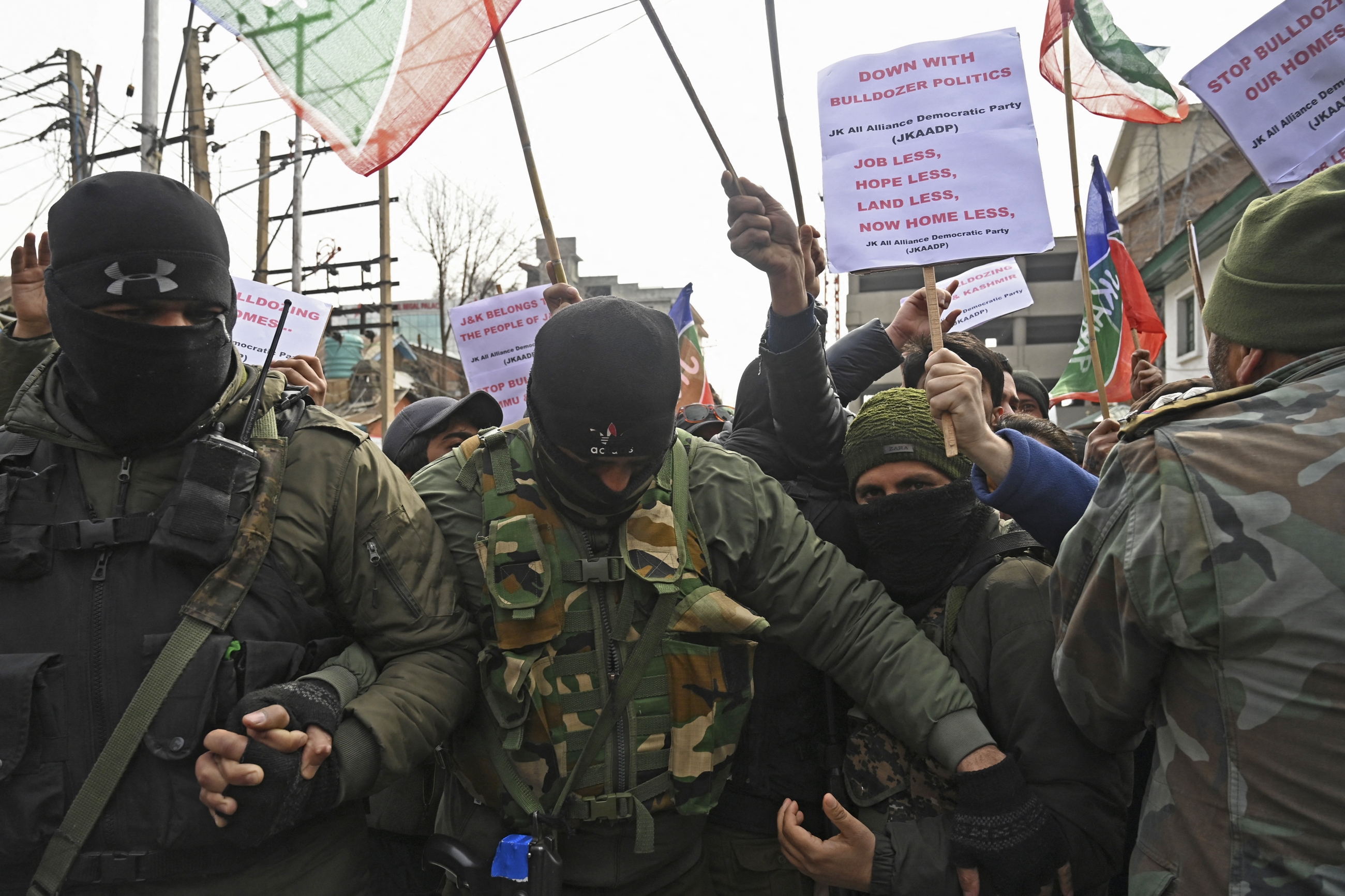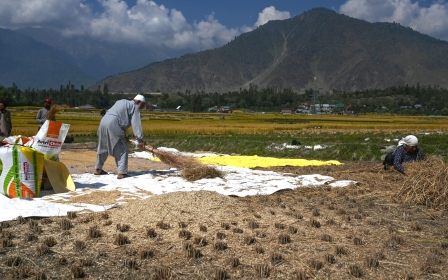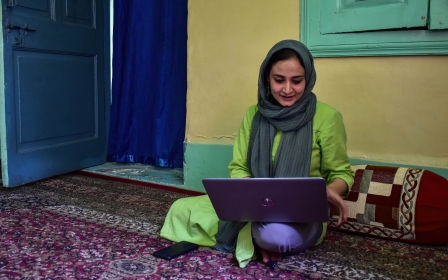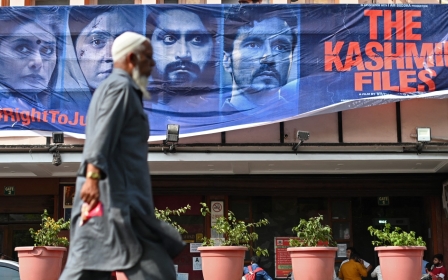Amnesty accuses UK-based firm of 'gross human rights violations' in Kashmir

Bulldozers from British construction equipment giant JCB are being used to commit "gross human rights violations" in Indian-controlled Kashmir, human rights group Amnesty International has said, as Narendra Modi's government exerts a mass eviction drive in the valley.
Tensions are running high in several districts in Kashmir over the past several days, after Indian authorities demolished parts of homes, businesses and farmlands they say encroach on state land.
Activists and residents dispute the accusation, saying the Indian government was using "the law" as a pretext to economically disempower Kashmiris and institute demographic change.
The evictions were temporarily halted without explanation or clarification from officials.
New MEE newsletter: Jerusalem Dispatch
Sign up to get the latest insights and analysis on Israel-Palestine, alongside Turkey Unpacked and other MEE newsletters
Many residents told Amnesty that authorities had neither informed them nor followed any process before demolishing their property.
Amnesty added that several residents even possessed documents proving ownership of their properties, but officials had refused to allow them to make their case before bulldozers destroyed their homes.
In a statement released last week, Amnesty International UK’s Economic Affairs director Peter Frankental said that the UK firm JCB, whose bulldozers were being used to dismember homes and businesses, "should be horrified that their equipment is being used in some of these demolitions" and called on the company to take "active steps to prevent this".
“At the very least, JCB should use their dealer and customer contracts and their diagnostic technology to prevent such misuse, including by decommissioning machines remotely where possible.
“If JCB fails to act over Kashmir it would be another example of the company falling short of its obligation to conduct proper human rights due diligence over how its machines are being used around the world."
JCB did not reply to MEE's multiple requests for comment by the time of publication, and it is not known whether or not JCB was aware that its machines were being used to conduct these evictions.
Settler-colonial project
Amnesty's statement came a day after Legal Forum for Kashmir (LFK), an international advocacy group based in Pakistan, released a report detailing the eviction project in 20 districts in the valley.
The 187-page report, "The Great Land Grab: Disempowering People in Indian Occupied Jammu & Kashmir", argues that when India revoked Article 370 which ended Kashmir's semi-autonomous status in August 2019 - including Article 35A that restricted land ownership to Kashmiri permanent residents - it opened the floodgates for the Indian government to exercise several other laws to dispossess Kashmiris.
"Under the Reorganization Act 2019 the occupying state repealed and amended more than 200 laws which claimed to safeguard the land and citizenship rights of indigenous Kashmiris," the report said, likening the process in Kashmir to Israel's settler colonial project in Palestine.
In its report, LFK concluded that Kashmir was "witnessing a new trend of state persecution under the pretext of alleged anti-encroachment drive" concerning "178005.213 acres in Kashmir region and 25,159.56 acres in Jammu".
According to the LFK, the Indian government has accused the United Nations Military Observer Group in India and Pakistan (UNMOGIP), based in Srinagar since 1949, of "encroaching" on "state land".
Mohamed Junaid, an assistant professor of anthropology at Massachusetts College of Liberal Arts, told Middle East Eye that the encroachment charge is a means to dispossess Kashmiris.
"Under the direct rule of the Indian bureaucrats, with Kashmiris left with neither representation nor the right to express dissent, what is unfolding in Kashmir under the guise of retrieving 'encroached land' is the systematic dispossession of Kashmiris. Indian bureaucrats are mum about the most visible land encroachment in Kashmir - the tens of thousands of acres under its military occupation."
Junaid says Kashmiris who have been living and have built communities on “state land” for decades are being sacrificed at the altar of profit.
"Indian authorities want to sell and lease the lands they take over to the highest bidders - read that as wealthy Indians - which means Kashmiri communities have no chance of returning to their lands. This is classic settler colonialism."
Aakar Patel, Amnesty International India’s chair, described the ongoing demolitions as appearing "to be an extension of the brutal human rights violations" witnessed in Kashmir. He also called on India to immediately put an end to the evictions.
"No one should be made homeless or vulnerable to other human rights violations because of evictions," Patel said in a statement released earlier this week.
The demolitions also follow a similar pattern of eviction and demolition tactics exercised by the Indian government in several parts of the country. Over the past year in particular, the Indian government has specifically targeted homes belonging to Muslims in several states over the same pretext of “illegal encroachments”.
"The abrupt nature of demolition drives, leaving little room for legal investigations, is profoundly altering how Muslims perceive normal life in India, blurring the lines between public and private space. The demolitions cause Muslims economic harm, while also damaging their political standing," writer Sara Ather recently argued.
For several decades, Kashmiris have been demanding the right to self-determination as promised by the 1948 UN Security Council Resolution 47.
Kashmir is claimed in full by both Pakistan and India and a de-facto border separates Indian-controlled Kashmir from the part controlled by Pakistan.
Since an uprising against Indian rule began in 1988, more than 70,000 people have been killed, and several thousand have "disappeared".
There are around 700,000 Indian troops in Kashmir, rendering it one of the most mililtarised territories on the planet.
The severing of Article 370 and Article 35A also meant that Indians could now purchase land in Kashmir as well as obtain residency rights in the state.
Several Kashmiri scholars have already warned that India was actively looking to replicate Israeli tactics in Kashmir.
India is already the largest buyer of Israeli weapons and both countries have begun to co-produce arms in India. In November, Israel announced it would be opening up two agricultural "Centers of Excellence" (CoE) in Kashmir.
In 2019, India's former consul general to New York told a private gathering that India would emulate Israel's settlements in Kashmir.
"It has happened in the Middle East. If the Israeli people can do it, we can also do it,” Sandeep Chakravorty said.
According to JCB's website, the company began operating in India in 1979. It is now a fully-owned subsidiary with five factories across the country exporting products to around 65 countries.
Middle East Eye delivers independent and unrivalled coverage and analysis of the Middle East, North Africa and beyond. To learn more about republishing this content and the associated fees, please fill out this form. More about MEE can be found here.


![A bulldozer demolishes the house of Javed Mohammad in India after authorities accused him of taking part in protests in June 2022 [AFP]](/sites/default/files/india%20jcb.jpeg)


